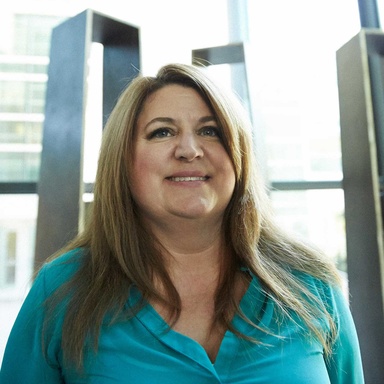
Whether you’re a few years into your career or a veteran of the boardroom, we make the case for an MBA at any age.
Some say age is just a number… some say it’s a state of mind. But if you're wondering if it’s too late for grad school, age can weigh heavily on your decision-making process.
So what is a good age for an MBA? An MBA is valuable at any age if you’re in it to develop a skillset, try something new, and become a more well-rounded leader, manager, or individual contributor.
For an older student with more experience, an MBA may be more about building a new muscle and staying on-trend than making a big move. On the other hand, if a career change or promotion is in the cards, earning the degree at a younger age means you’ll have more time to leverage its value.
What is the average age to get an MBA?
According to a recent article in Poets & Quants,1 the average age of an MBA student in the USA is 28—a number that reflects full-time MBA programs.
Iowa MBA students clock in slightly above that average, at 32 years old. Online MBA students across the board enter their program at an average of 33 years of age, according to U.S. News & World Report.2
When you ask how old is the average MBA student, full vs part-time programs have to come into consideration.
The MBA average age varies somewhat by school. Top-ranked, full-time programs tend to attract a younger group of students. Of the top-50 ranked full-time programs, Stanford’s average age for MBA admits is 27 (the youngest average), with Washington (Foster) and Rice landing at 29 (the oldest).
According to a Graduate Management Admissions Council survey of application trends,3 32% of full-time MBA applicants have between two and six years of work experience.
What may surprise you is that the number of applicants overall that had 10+ years under their belt. Executive MBA programs had the majority of more-experienced applicants (69%) but professional (part-time) and full-time MBA programs had 29% and 12% respectively as well.
Is an MBA worth it after 30? 40? 50?
The consensus among educators and students is that an MBA education adds value at any age. For younger students in their 30s, the credential could help propel you into higher-level roles earlier in your career.
Does it make sense to get an MBA at 40? Making a career change at 40 with an MBA is definitely possible when you leverage your education to pivot into a completely new field—or move into a leadership role.
In your 50s, an MBA could offer context around changes to the business landscape, new technologies, and improve your ability to communicate with colleagues across teams and varying age groups.
Iowa MBA Sarah Thompson went for her MBA in the middle of a decades-long career with TransAmerica after missing out on two promotions:

“You’re never going to think you have the time or resources to get your MBA, but getting started is the important thing. Once you have that degree, people will know you’ve got what it takes.”
For Sarah, the MBA made a huge impact on her career, earning her those two promotions she initially missed out on. It’s also contributed to her personal growth. “I am dramatically different,” Sarah says. "More confident, more willing to ask hard questions, more ready to take risks.”
33
Source: U.S. News & World Report
28
Source: Poets & Quants
32
How late is too late for an MBA?
If you believe in the value of professional development, lifelong learning, and growing as a contributor and leader—then it’s never too late. As you age and your goals change, an MBA can still provide valuable opportunities, be it through a career change, a promotion, or simply adding more value in your current role.
“An MBA helps you think differently—to look at things in the big picture and not micro-focus on a singular path. You see the whole pie and not just your piece in it. It removes some of the limits you may have placed on yourself and your career.”
When searching for the right fit for both your age and experience, the best MBA programs for older applicants are flexible, part-time programs that fit into the busy lives of working professionals. You’ll also want to look for advanced curriculum that emphasize leadership and strategy.
Some older candidates may also consider an executive MBA or executive certificate that has curriculum tailor-made for professionals with upwards of 10 years of experience.
If you don’t take care of your career, no one else will.
When considering why should I get an MBA, here’s the short answer: At any age or experience level, an MBA demonstrates that you’re committed to growth, helps you communicate across silos to work more strategically, and gives you an understanding of how the different functions of business connect to one another.
Interested in learning more about Iowa’s top-ranked, part-time MBA?
Related articles
Still have questions?
Q: What are the benefits of pursuing an MBA at different ages?
A: Pursuing an MBA at various ages can provide distinct advantages.
- Early Career (20s):Develop foundational skills and boost career trajectory.
- Mid-Career (30s-40s):Expand leadership skills and pivot to new industries.
- Later Career (50+):Gain credibility and network with younger professionals.
Q: How can I determine the right time to apply for an MBA program?
A: Consider applying for an MBA when you have:
- Relevant work experience (typically 2-5 years). The Iowa MBA requires at least 18 months of professional work experience.
- A clear career goal or direction.
- Financial readiness and support for your education.
Q: What factors should I consider when choosing an MBA program?
A: Evaluate these key factors when selecting an MBA program:
- Program Reputation:Look for rankings and alumni success.
- Curriculum:Ensure it aligns with your career goals.
- Networking Opportunities:Assess access to industry leaders.
- Format:Choose a full or part-time program based on your needs
Q: How does work experience impact the MBA admissions process?
A: Work experience plays a crucial role in MBA admissions. Admissions committees typically look for:
- A minimum of 2-3 years of professional experience.
- Evidence of leadership or managerial potential.
- Clear articulation of how the MBA will enhance your career.

Find out what Iowa MBA experts look for in the admissions essay.
Q: What are common career paths for MBA graduates based on age?
A: MBA graduates can pursue various career paths influenced by their age:
- Young Graduates:Entry-level management roles or consulting.
- Mid-Career Professionals:Senior management or specialized roles.
- Experienced Professionals:Executive leadership or entrepreneurial ventures.
Q: How can I leverage my MBA for a career change later in life?
A: To effectively leverage your MBA for a career change, consider:
- Networking with alumni in your desired field.
- Seeking internships or projects that align with your new career.
- Highlighting transferable skills in your resume and interviews.
- Connecting with classmates in your desired industry through group projects, events, or coursework.
Q: What financial options are available for financing an MBA?
A: There are several financial options to consider for funding your MBA:
- Scholarships:Offered by schools or external organizations.
- Student Loans:Federal and private loan options.
- Employer Sponsorship:Some companies offer tuition reimbursement.
- The Iowa MBA offers several financing options.
Q: How do online MBA programs compare to traditional programs regarding age?
A: Online MBA programs can be advantageous for older students. They offer:
- Flexibility to balance work and study.
- Access to diverse networking opportunities globally.
- Cost savings on commuting and housing.
- Evening courses that work with your schedule.
Sources
- John A. Byrne. “Average Age & Work Experience at Top MBA Programs”. Poets & Quants, November 2019
- Friedman, Jordan. “U.S. News Data: The Average Online MBA Student”. U.S. News & World Report, May 23, 2017
- A. Williams, et al. “Graduate Management Application Trends Survey – 2023 Summary Report”. Graduate Management Admission Council, 2023

